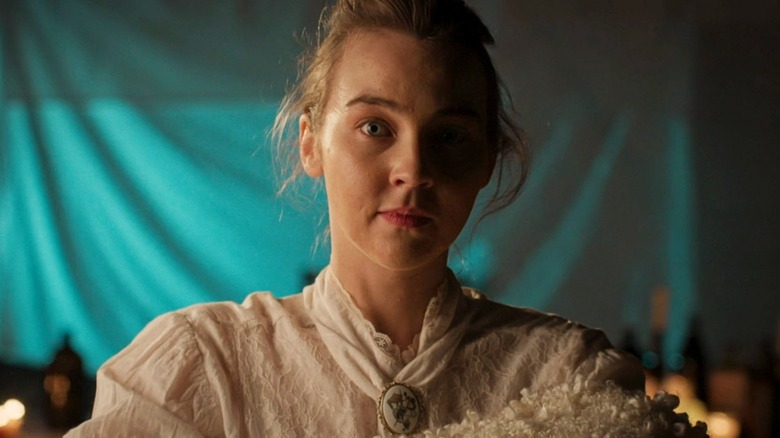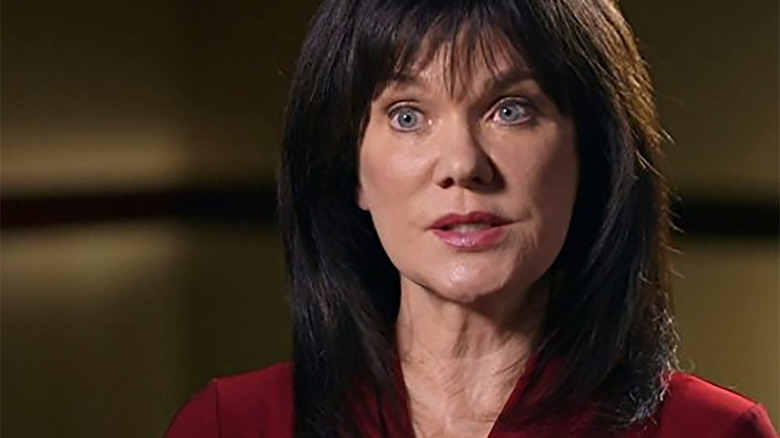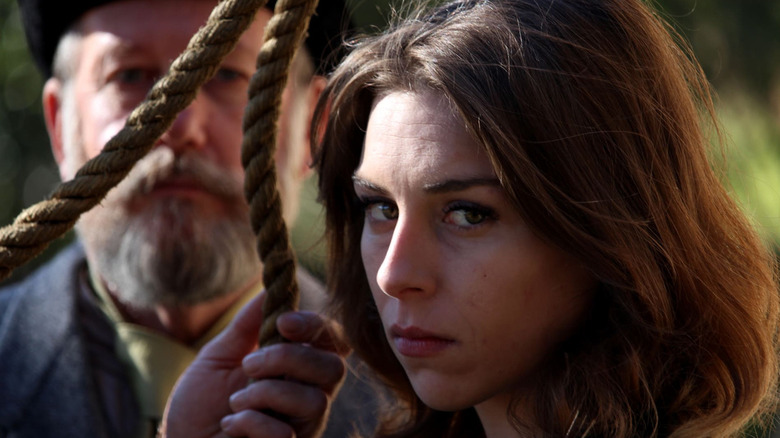The Daily Stream: Deadly Women Is Trashy True Crime At Its Camp Finest
(Welcome to The Daily Stream, an ongoing series in which the /Film team shares what they've been watching, why it's worth checking out, and where you can stream it.)
The series: "Deadly Women"
Where you can stream it: Seasons 7-13 are available on Hulu; all 13 seasons are available on Discovery+
The Pitch: There are many kinds of true crime documentary series, ranging in tone and respect for the material, but few are as compellingly entertaining as Investigation Discovery's "Deadly Women." The series uses re-enactments to tell murderous true tales about a variety of women who kill. This isn't the kind of show that's going to give real insight into the minds of killers or the anguish of survivors, as the vast majority of the talking heads are crime experts or investigators. It's tawdry, trashy stuff: the modern equivalent of Victorian penny dreadfuls, luxuriating in the nastiest bits of salacious detail.
"Deadly Women" kicked off with its first season in 2005 and more than a dozen seasons later it still has the deliciously campy tone of the late '90s and early aughts. The re-enactments are low-budget and filled to the brim with over-the-top acting, unnecessary Dutch angles, and an eternally dramatic voice-over by actor Lynnanne Zager.
Throughout the course of the series they interview a handful of different crime experts, but the real heart of the show is former FBI criminal profiler Candice DeLong, who was the lead profiler in San Francisco working on the Unabomber case. DeLong's storytelling delivery is a beautiful thing — she knows exactly which words to let hang and when to drop a sentence like an anvil. There's no subtlety in "Deadly Women," but that's the fun of it. There are endless documentaries and documentary series trying to engage viewers in a mystery or enlighten them on a subject, but "Deadly Women" exists purely to entertain.
Why it's essential viewing
For those of us who grew up watching shows like "Unsolved Mysteries" or "Beyond Belief: Fact or Fiction?," there's a weird comfort in the campy goofiness of reenactments. The musical stings, narrator's words left hanging right before an act of violence, and other hallmarks of trashy reenactments become as familiar as the laugh track on a sitcom or the musical intro on a late night show. There's a rhythm to the ridiculousness that the series managed to keep steady for 13 seasons, which is honestly pretty impressive.
"Deadly Women" is consistent, offering the same levels of lowest-common denominator commentary and levels of dedication to accuracy. The casting is often bizarre, with teenage characters sometimes played by adults clearly in their late 30s or 40s, which can get really weird when they do childish things. There's an episode about a killer cheerleader that makes the cast of the original 90210 look positively glowing with youth, but that's par for the course with "Deadly Women."
The most brilliant of the reenactments, however, are the ones that take place before 1990. Historical reenactments of crimes from centuries past are guaranteed to be a good, goofy time, with every stereotypical element imaginable to let the audience know when things are set. If it's the roaring '20s, you'd better bet your bottom dollar there's going to be flappers, jazz, and unnecessary Brooklyn accents. If it's the 1950s, expect poodle skirts and root beer floats.
The one major thing they never quite get right, however, are the settings themselves. Eagle-eyed viewers will quickly spot modern cars, appliances, and things like telephone poles in the background when they weren't supposed to exist. This weird anachronistic mix of overdoing certain elements while completely flubbing others is charming in a profoundly silly way. There's not really any feminist twist or misogyny at play, either; this is just a murder series about killer broads.
So goofy it's good
No one watches Investigation Discovery, the channel that created "Deadly Women," to learn anything. It's a channel dedicated to our base instincts as humans to watch as something awful happens; we can't help but stare at a train wreck. It's exploitative at its worst, but the delivery of the stories feels so fantastical that it's almost hard to feel uncomfortable about it. For example, the single most emotionally devastating cinematic experience of my life was watching the 2008 documentary "Dear Zachary," about a murder case in Canada where the killer ended up taking her own life and that of her young son. It's harrowing, heartbreaking stuff, and yet when "Deadly Women" did an episode on the case, it took me halfway into the story to even realize it was the same case.
Right about now you might be asking yourself why I'm recommending a series with so many egregious flaws. Why, exactly, should you watch something that I would describe as terrible and occasionally tasteless? There's a whole host of movies out there that people watch because they enjoy the campy bits, or the terrible bits. "Mystery Science Theater 3000" built an entire franchise off of watching garbage and enjoying the heck out of it. DeLong and her crew of crime experts make "Deadly Women" a blast, not because it's accurate or well-made, but because it's as campy as can be.


